Description
HRM3701 Assignment 2 Semester 1 | Due 27 March 2025. All questions answered. Employee layoffs at Hope Regional Medical Centre Hope Regional Medical Centre is a medium-sized, 400-bed hospital in Johannesburg. It was established in 1908 by a group of doctors. The facility has grown gradually over the years and is now the third largest medical facility in the city. It is entirely nonunion and has never experienced an employee layoff since its inception. Robert Perry has been the CEO of the Hope Regional Medical Centre for 11 years. Eight years ago, he hired Sharon Dlamini as director of human resources. Dlamini has an MA in Human Resource Management and has been instrumental in formalising the institution’s human resources’ policies and procedures. Occupancy rates in Hope Regional Medical Centre ranged between 76 and 82 percent from 1990 to 2002. However, since then, occupancy has fallen to 57 percent. This decline has been experienced throughout the industry and is the result of changing reimbursement policies, emphasis on outpatient services, increasing competition, and the financial meltdown of . The declining occupancy rate has affected this hospital’s revenues to such an extent that it ran a deficit for the first time last year. The only response to these changes thus far has been a tightening of requirements for equipment or supply purchases. At the most recent quarterly meeting of the Board of Directors, Perry presented the rather bleak financial picture. The projected deficit for the coming year was R3,865,000, Unless some additional revenue sources were identified or some additional savings were found. The Board’s recommendation, based on the immediate crisis and the need to generate short- term savings, was to lay off employees. They recommended that Perry consider laying off up to 10 percent of the hospital’s employees with an emphasis on those in “nonessential” areas. Perry responded that the centre’s employees had never been laid off in the history of the institution. Moreover, he viewed the employees as “family” and would have great difficulty implementing such a layoff. Nevertheless, since he had no realistic short-term alternative for closing the “revenue gap”, Perry reluctantly agreed to implement a layoff policy that would be as fair as possible to all employees, provide a guarantee agreement requirement for those laid off, and find additional revenue sources so that layouts would be unnecessary in the future. Perry then called Sharon Dlamini into his office the next morning, shared his concerns, and asked her to prepare both a short-term plan to save R 3,000,000 over the next year through staff layoffs, as well as a long-term plan to avoid layoffs in the future. Dlamini’s concerns were that the layoffs themselves might be costly in terms of lost investment in some of the laid off employees, higher turnover costs, lost efficiency, potential lawsuits, and lower morale. She was concerned that the criteria for the layoffs not only be equitable but also appear to be equitable to the employees. She also wanted to make sure that those being laid off received “adequate” notice so that they could make alternative plans or so the hospital could assist them with finding alternative employment. Since the hospital had no previous experience with employee layoffs and no union contract constraints, her feeling was that both seniority and job performance should be considered in determining who would be laid off. Dlamini knew the hospital’s performance appraisal system was inadequate and needed to be revamped. While this task was high on her “to do” list, she also knew she had to move ahead with her recommendations on layoffs immediately. The present performance appraisal system is a traditional checklist rating scale with a summary rating since there is no forced distribution, the average ratings of employees in different departments vary widely. Table 1 shows the summary ratings of employees in each department. Most supervisors across all departments rate many of their subordinates either “satisfactory” or “outstanding”. Dlamini has done a quick review of those employees whose overall ratings were “unsatisfactory” or “questionable”. Most are employees with less than three years of seniority, whereas the “satisfactory” employees have worked in an average of seven years for Hope Regional Medical Centre. Dlamini is preparing to submit her recommendations to Perry and has come to you for advice. Table 2 provides a summary of the distribution of employees and payroll expense by the department for the most recent year. Table 1: Percentage Distribution of Performance Appraisal Summary Ratings by Department in Hope hospital Department Unsatisfactory: Needs to Improve Substantiality Questionable: Needs Some Improvement Satisfactory: Meets Normal Expectations Outstanding: Substantially Exceeds Norms Nursing 6.4 6.4 54.2 33.0 Allied Health 5.7 6.2 47.8 40.3 Central Administration 2.7 3.1 67.5 26.7 Dietetics/Nutrition 2.1 6.2 68.3 23.4 Housekeeping/Maintenance 7.8 12.4 54.6 25.2 Medical Staff 1.1 6.2 63.8 28.9 Table 2: The Distribution of Employment and Payroll Expenditures at Hope hospital Department Number of Employees Payroll (R) Annual Turnover Rates (%) Nursing 602 12.2 Allied Health 261 5 742 000 8.7 Central Administration 154 6 160 000 3.5 Dietetics/Nutrition 65 1 430 000 7.3 Housekeeping/Maintenance 36 540 000 8.4 Medical Staff 32 1 680 000 2.1 TOTAL 1150 9.5* *represents weighted average turnover for all employees Questions: 1. Identify and explain key external and internal factors that have contributed to the financial decline of Hope Regional Medical Centre. (4) 2. Aside from employee layoffs, examine other alternatives (at least 4) for dealing with the factors that you have identified in Question 1. (4) 3. Evaluate the ethical implications of implementing employee layoffs as a solution to the hospital’s financial crisis. Provide at least 2 ethical implications (4) 4. There are two parts to this question: 4.1 Using Tables 1 and 2, develop a fair and equitable layoff procedure for Hope Regional Medical Centre. How much of the targeted R3 million can you generate? (6) 4.2 Which employees would you exclude as part of this layoff plan and why? (2) 5. One of the Board Members raised the issue of “survivors’ guilt”. After explaining what “survivors’ guilt” entails, categorise the effects of a layoff plan on “survivors” morale, job security, organisational commitment, productivity and career planning. How could you avoid or minimise any potential problems in these areas. Provide both specific strategies and general strategies on how to minimise potential problems. (15) 6. Critically analyse the difficulties associated with using ‘performance’ as a criterion for layoffs in an organisation. Drawing on relevant organisational theories, discuss how the challenges you identified can influence the fairness and effectiveness of performance-based layoffs. Additionally, propose evidence-based strategies that organisations can implement to mitigate these challenges and ensure that performance evaluations lead to fair and constructive outcomes for both employees and the organisation. (15) Total: 50 marks

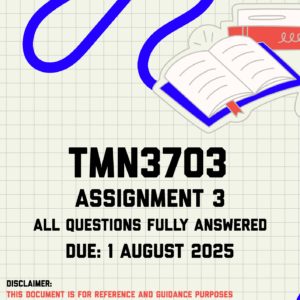





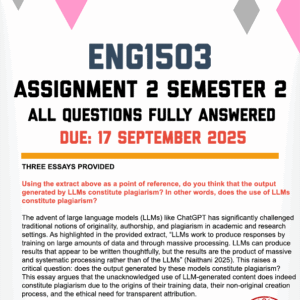


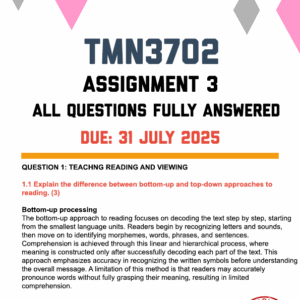

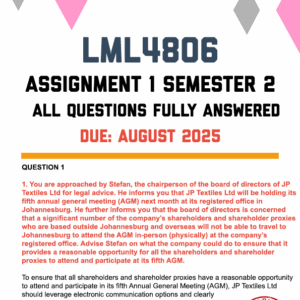










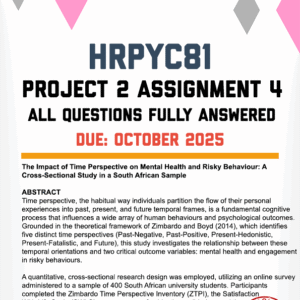




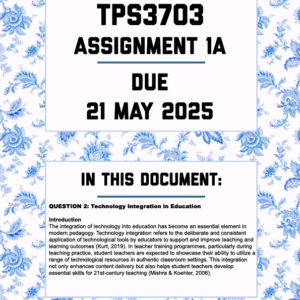

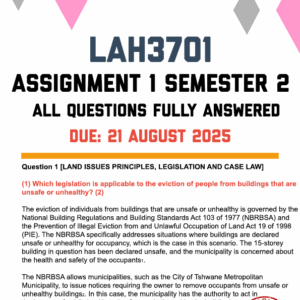

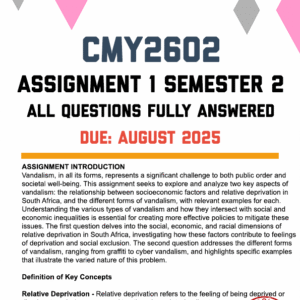











![ETH302S-All-in-One-Exam Pack [2023]](https://studypass.co.za/wp-content/uploads/2022/12/1-41-300x300.png)


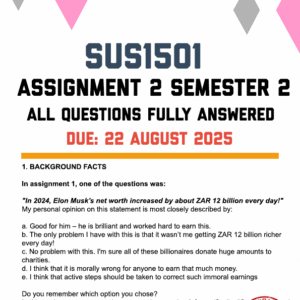
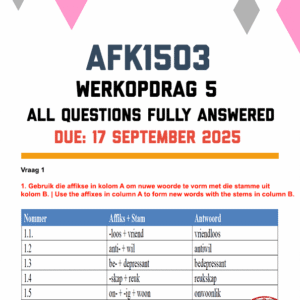





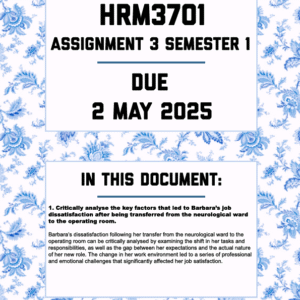


Reviews
There are no reviews yet.